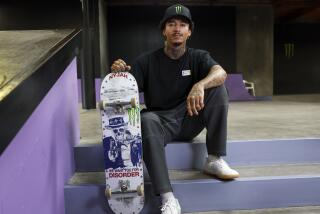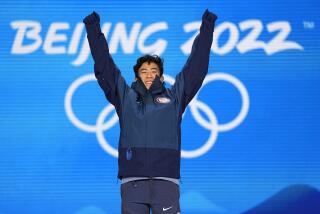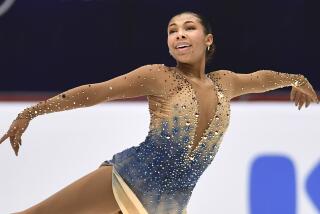Yagudinâs Passion Plays Out on Ice
He sobbed in his coachâs arms when he knew he had won the Grand Prix Final, overcome by the joy of achieving the redemption he so desperately wanted after a year of physical and emotional struggle.
Alexei Yagudin wasnât ashamed to reveal his emotions to his coach, Tatiana Tarasova, or to the world on that day last December. The three-time world figure skating champion from Russia leads with his heart, a trait that could be his strength at the Salt Lake City Winter Olympics but also carries the potential to be his downfall.
âIt means a lot for me,â he said of his victory over rival Evgeny Plushenko, achieved by a 4-3 margin in the final part of the three-phase competition.
âI was sure I was capable and I was ready to skate good this year but still, until you face the competition, itâs hard to prepare for something.... I kind of lost that power in myself and it was really hard last season for me to believe that actually I could beat him, because he was so good all the time and I had a terrible season last year. I was pretty scared. I began to cry because Iâve been waiting for this for a long time.â
Yagudin, 21, hadnât defeated his younger compatriot in a major competition since the 2000 World Championships at Nice, France. In that event Plushenko, then 17, fell apart in the long program, while Yagudin landed two quadruple jumps in winning his third consecutive title.
But Plushenko, a superb technician, beat Yagudin last season at the Russian and European championships, the Grand Prix Final and the World Championships, ending Yagudinâs reign. Haunted by that loss, Yagudin worked himself into a frenzy last summer.
Obsessed with the notion that losing weight would enhance his speed and jumping ability, he shed nearly 20 pounds, but was too weak to perform well at the season-opening Goodwill Games in September. He finished third behind Plushenko and Michael Weiss of the U.S.
âIt affected my whole life,â he said of losing the world title. âI was alone for the whole summer. I was working so much. I was not eating....
âItâs pretty hard to see yourself in second place, and thatâs part of my life. Iâm happy, at least, thatâs in the past. Iâm looking to the future,â said Yagudin, who has since moved back up to a healthier weight. âI feel really good and I feel that I am back.â
Yagudin and Plushenko seem to have made a game of dodging each other. They had no overlapping Grand Prix assignments this season, and after Yagudin pulled out of the Russian championships because of an ankle injury, Plushenko withdrew from the European championships because of a groin injury.
That merely enhances the drama that will unfold at Salt Lake City, where Yagudin and Plushenko will compete, quad for quad, for the gold medal.
They are unquestionably the class of the pack. Tim Goebel of the U.S. is in their class as a jumper but lacks their refinement and musicality. U.S. champion Todd Eldredge is expressive, but he lacks the Russiansâ technical prowess. And Russiaâs Alexander Abt, who trains at Lake Arrowhead and was second at last monthâs European championships, doesnât have their international success or experience.
All signs point to Yagudin or Plushenko standing atop the podium at Salt Lake City. But will it be Plushenko, who inexplicably hid his talents behind herky-jerky music and garish costumes at the Grand Prix Final? Or the soulful Yagudin, who acknowledges having been âmaybe wildâ when he was younger but denies persistent rumors that a drinking problem led to his expulsion from the 2000 Tom Collins Champions on Ice tour?
Even the experts canât pick a winner.
âI think Plushenko is just a touch stronger from a technique point of view,â said Ilia Kulik of Russia, the 1998 Nagano gold medalist. âWhen I watch jumps, I see cleaner technique in Plushenkoâs jumps than Yagudinâs jumps. But Yagudin is a touch physically stronger and he can compensate sometimes for a couple of technical mistakes ... It will be fun to watch who can handle it.â
Viktor Petrenko, who in 1992 became the first skater from the former Soviet Union or its republics to win the menâs singles gold medal, also sees little separating them.
âI think theyâre both very strong technically and artistically,â Petrenko said. âThe good thing about them is that they both present two different styles.
âTheir technique has a different level. Plushenko is more like an entertainer. Yagudin is more like a drama skater. All his programs are like that. It depends on who likes what, an entertainer or drama.â
Yagudinâs dramatic gifts spring from the events of his life.
He was born in St. Petersburg, Russia, a sickly child whose mother, Zoya, took him skating when he was 41/2 to improve his health. His parents divorced when he was 12 and his father, Konstantin, moved to Germany, severing contact with his wife and son.Young Alexei took to skating quickly. Under the tutelage of Alexei Mishin, a former pair skater who had coached Alexei Urmanov to the 1994 Olympic gold medal, Yagudin became the world junior champion in 1996 at age 15 and won his first senior title in 1998.
But he and Mishin, both strong personalities, clashed. Mishin had other students who needed his time, among them Urmanov and Plushenko. Yagudin didnât want to share Mishin--particularly with Plushenko. The former rinkmates barely speak.
âI canât say that we are close friends, but we are from the same team and we just compete against each other,â Yagudin said. âWe can talk, but still I donât have anything to say to him and he probably doesnât have anything to say to me. But of course we say to each other, âCongratulations.â If I win, heâd say this to me. If he wins--and that was often last season--I say, âCongratulations.ââ
Yagudin took the bold step in 1998 of leaving Mishin and Russia for Tarasova and the U.S., settling first in New Jersey and later in Newington, Conn. He won the 1999 and 2000 world titles under Tarasova, but seemed to have a tough time adjusting to a new culture and new riches and was sent home from the 2000 Tom Collins tour.
Collins declined when asked to discuss what happened.
âItâs a touchy issue,â he said. âItâs a buried thing, and I want it to stay buried.â
But insiders say Yagudin was rowdy, destructive and allegedly drank too much.
Yagudin, however, claimed he didnât know why he was expelled. He also said he didnât abuse alcohol.
âI was just a little bit silly maybe,â he said. âBut right now I am a little bit more focused. I never had a problem.... When people see me in a bar, drinking wine, they think I am sitting there a long time. But that is not true.
âWe are the same [as non-skating] people. We have birthdays. There is time to have a glass of wine. There is nothing bad about that. People like to talk about that. Thereâs nothing bad about it. I know myself and Iâm fine with that.â
He also knows and uses his skating assets: fast footwork, exceptional jumps and a theatricality that enthralls audiences. Heâs evocative in his âWinterâ short program, tossing ice chips into the air like snowflakes at one point to create a contemplative mood. Heâs bold and forceful in his âMan in the Iron Maskâ long program, using swift turns and thrusts to pantomime the climactic fencing scene.
But he also has a sharp sense of humor. During the exhibition that followed his victory at Skate Canada, he joined ice dancers Shae-Lynn Bourne and Victor Kraatz to form an impromptu threesome.
âWe donât have to be just technically strong. We also have to be artists on the ice,â he said. âYou have to play with the crowd and make them more interested in figure skating.
âItâs boring doing the same thing all the time. You want to change, and thatâs what I try to do on the ice. I try to change things a little bit.â
Although he has lived in the U.S. for nearly four years and plans to settle here, Russia remains in his soul.
âI am still Russian and I am really proud of my home country,â he said. âUnfortunately, we are not doing that well as, for example, Americans.
âBut I am still going to be Russian the rest of my life and Iâm really proud of that.... The Russian people, they won almost every war they were in ... They like to fight until the end. Thatâs what I am like on the ice.â
He has one more big fight coming at Salt Lake City. And although he was admittedly far from his best at the European championships, Yagudin is confident he will be the victor.
âIâm 100% sure that Iâm capable to be really really good and to be first. Now, for sure, I believe in myself and my power,â he said. âI feel like Iâm back on my track. It feels like Iâm the real Alexei Yagudin.â
More to Read
Go beyond the scoreboard
Get the latest on L.A.'s teams in the daily Sports Report newsletter.
You may occasionally receive promotional content from the Los Angeles Times.







